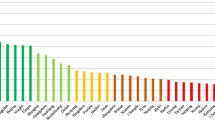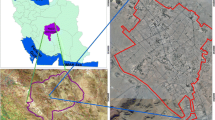Abstract
Sustainable urban development focuses on enhancing urban well-being, while also balancing the demands of urban social and economic development, natural resource consumption, and environmental pollution. This work used general data envelopment analysis to assess the urban sustainability efficiency (USE) and sustainability potential (SP) in Lanzhou and Xiamen, two cities that are characteristic of urban areas in western and eastern China. The assessment indicator system included important natural and urban welfare factors as input and output indices, respectively. The results showed that overall urban sustainability efficiency increased in Lanzhou and Xiamen from 1985 to 2010, but that the sustainability of natural resources clearly decreased. The urban sustainability efficiency of Xiamen was higher than that of Lanzhou, and the sustainability potential of Xiamen was lower than that of Lanzhou; this indicates that Xiamen performed better in terms of urban sustainable development. The urban sustainability efficiency in Xiamen has increased with increasing urban population, and the rate and scale of economic development have been higher than in Lanzhou. The assessment and analysis performed in this study show that cities with different natural resources and development characteristics have different forms, patterns, and trajectories of sustainable development.







Similar content being viewed by others
References
Bugliarello, G. (2004). Urban sustainability: science, technology and policies. Journal of urban technology, 11, 1–11.
Chapman, S. (2014). A framework for monitoring social process and outcomes in environmental programs. Evaluation and Program Planning, 47, 45–53.
Chen, Y., Chen, C.-Y., & Hsieh, T. (2011). Exploration of sustainable development by applying green economy indicators. Environmental Monitoring and Assessment, 182(1), 279–289.
Dietz, S., & Neumayer, E. (2007). Weak and strong sustainability in the SEEA: concepts and measurement. Ecological Economics, 61, 617–626.
Dong, R., Tang, M., Zhou, K., et al. (2013). Study on the modified quadrat sampling method for urban ecosystem network monitoring. International Journal of Sustainable Development & World Ecology, 20, 210–215.
Fan, S. (2006). Theoretical analysis on the increasing process of urban sustainability. Economic Geography, 26, 961–965.
Hedlund-de Witt, A. (2014). Rethinking sustainable development: considering how different worldviews envision “development” and “quality of life”. Sustainability, 6, 8310–8328.
Heinke, G. W. (1997). The challenge of urban growth and sustainable development for Asian cities in the 21st century. Environmental Monitoring and Assessment, 44(1), 155–171.
Holden, M., Roseland, M., Ferguson, K., & Perl, A. (2008). Seeking urban sustainability on the world stage. Habitat International, 32, 305–317.
Huguenin, J.-M. (2015). Data envelopment analysis and non-discretionary inputs: how to select the most suitable model using multi-criteria decision analysis. Expert Systems with Applications, 42, 2570–2581.
Khodakarami, M., Shabani, A., & Farzipoor Saen, R. (2014). A new look at measuring sustainability of industrial parks: a two-stage data envelopment analysis approach. Clean Technologies and Environmental Policy, 16, 1577–1596.
Li, L., & Zheng, D. (2002). Regional sustainable development assessment: progress and outlook. Progress in Geography, 21, 237–248.
Liu, H., Zhou, G., Wennersten, R. F., et al. (2014). Analysis of sustainable urban development approaches in China. Habitat International, 41, 24–32.
Luo, Y., & Niu, W. (2007). The overview of China's sustainable development: pandect of China's sustainable development (volume 1). Beijing: Science Press.
Luo, N., Li, J., & Luo, F. (2013). Empirical analysis on the relationship between the China urbanization and regional eco-efficiency. China Popilation, Resources and Environment, 23, 53–60.
Maclarence, V. W. (1996). Urban sustainability reporting. Journal of the American Planning Association, 02, 185–202.
Mayer, A. L. (2008). Strengths and weaknesses of common sustainability indices for multidimensional systems. Environmental International, 34, 277–291.
Mori, K., & Christodoulou, A. (2012). Review of sustainability indices and indicators: towards a new city sustainability index (csi). Environmental Impact Assessment Review, 32, 94–106.
Podinovski, V. V., & Bouzdine-Chameeva, T. (2015). Consistent weight restrictions in data envelopment analysis. European Journal of Operational Research, 244, 201–209.
Rai, P. K. (2012). An eco-sustainable green approach for heavy metals management: two case studies of developing industrial region. Environmental Monitoring and Assessment, 184, 421–448.
Shen, L. Y., Jorge Ochoa, J., Shah, M. N., et al. (2011). The application of USE indicators—a comparison between various practices. Habitat International, 35, 17–29.
Si, L. (2011). Study on the ecological compensation mechanism in Gansu. Lanzhou: Lanzhou University.
Tang, H. (2013). The coastal cities evolution of land use and regional ecological environmental quality research during urbanization—taking Shandong Province as an example. Shenyang: Liaoning Normal University.
Toloo, M., & Tichý, T. (2015). Two alternative approaches for selecting performance measures in data envelopment analysis. Measurement, 65, 29–40.
Van Dijk, M. P., & Mingshun, Z. (2005). Sustainability indices as a tool for urban managers, evidence from four medium-sized Chinese cities. Environmental Impact Assessment Review, 25, 667–688.
Wei, J., Zhao, Y., Xu, H., et al. (2007). A framework for selecting indicators to assess the sustainable development of the natural heritage site. Journal of Mountain Science, 4, 321–330.
World Bank (1997). Expanding the measure of wealth: Indicators of environmentally sustainable development. Washington, D C.
Wu, J., He, C., Zhang, Q., et al. (2014). Integrative modeling and strategic planning for regional sustainability under climate change. Advances in Earth Science, 29, 1315–1324.
Yan, Y., Yu, L., Chen, S., et al. (2005). The capital connotation of sustainable development and relation analysis. Scientifit Progress and Countermeasures, 12, 27–29.
Yan, Y., Jia, J., Zhou, K., et al. (2013). Study of regional water footprint of industrial sectors: the case of Chaoyang City, Liaoning Province, China. International Journal of Sustainable Development & World Ecology, 20, 542–548.
Yin, K., Wang, R., An, Q., et al. (2014). Using eco-efficiency as an indicator for sustainable urban development: a case study of Chinese provincial capital cities. Ecological Indicators, 36, 665–671.
Zerafat Angiz, L. M., Mustafa, A., Ghadiri, M., et al. (2015). Relationship between efficiency in the traditional data envelopment analysis and possibility sets. Computers & Industrial Engineering, 81, 140–146.
Zhang, Y., & Yang, Z. (2007). Energy analysis of urban material metabolism and evaluation of eco-efficiency in Beijing. Acta Scientiae Circumstantiae, 27, 1892–1899.
Zhao, J. (1999). The critical analysis on the measurement of sustainable development of social-economic-natural complex ecosystem. Acta Ecologica Sinica, 15, 327–330.
Zhao, J., Liang, X., & Zhang, X. (1999). System analysis on the definition of sustainable development. Acta Ecologica Sinica, 19, 393–399.
Zhao, J., Liu, X., Dong, R., & Shao, G. (2016). Landsenses ecology and ecological planning toward sustainable development. International Journal of Sustainable Development & World Ecology, 23(4), 293–297.
Acknowledgements
This study was supported by the National Key Technologies R&D Program of China (Grant No. 2016YFC0502102) and the National Natural Science Foundation of China (Grant No. 71673268). The authors are grateful to all the people who helped complete this research and the anonymous reviewers for their suggestions on the manuscript.
Author contributions
Yan Yan, Chenxing Wang, and Peng Shan conceived and designed the study; Yan Yan conceptualized the paper and completed the English writing; and Chenxing Wang contributed to data collection, calculation, and results analysis. Yuan Quan and Di Wu contributed to the conceptual model. Chunli Zhao, Gang Wu, and Hongbing Deng contributed to manuscript revision. All authors read and approved the submitted manuscript, agreed to be listed, and accepted the version for publication.
Author information
Authors and Affiliations
Corresponding author
Ethics declarations
Conflicts of interest
The authors declare that they have no conflict of interest.
Rights and permissions
About this article
Cite this article
Yan, Y., Shan, P., Wang, C. et al. Assessment of urban sustainability efficiency based on general data envelopment analysis: a case study of two cities in western and eastern China. Environ Monit Assess 189, 191 (2017). https://doi.org/10.1007/s10661-017-5814-9
Received:
Accepted:
Published:
DOI: https://doi.org/10.1007/s10661-017-5814-9




